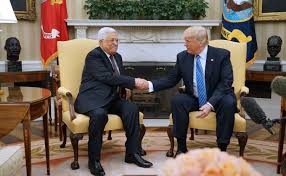THE United States (US) has insisted it would not allow Palestinian Authority President, Mahmoud Abbas, to travel to New York next month for a United Nations (UN) gathering of world leaders, where several U.S. allies are set to recognise Palestine as a state.
A State Department official said Abbas and about 80 other Palestinians would be affected by the decision to deny and revoke visas from members of the umbrella Palestine Liberation Organisation (PLO) and the West Bank-based Palestinian Authority (PA).
Abbas had planned to attend the yearly high-level UN General Assembly in Manhattan and was also set to attend a Summit there, where Britain, France, Australia and Canada have pledged to formally recognize a Palestinian state.
His office said it was astonished by the visa decision, adding it violated the UN “headquarters agreement.”
Under a 1947 UN “headquarters agreement.” the US is generally required to allow access for foreign diplomats to the UN in New York.
However, Washington has said it can deny visas for security, extremism and foreign policy reasons.
Nabil Abu Rudeineh, a spokesperson for Abbas, called on Saturday, August 30, for Washington to reconsider its decision.
“We call on the US administration to reverse this decision, which contradicts international law, specifically the Headquarters Agreement between the United Nations and the United States, which prohibits preventing any delegation from access,” he told Reuters.
Several European foreign ministers arriving at a European Union (EU) meeting in Copenhagen on Saturday criticised the US decision.
A UN General Assembly “cannot be subject to any restrictions on access,” French Foreign Minister, Jean-Noel Barrot, told reporters.
Irish Foreign Minister, Simon Harris, said the EU should protest the decision “in the strongest possible terms,” while Spain’s Prime Minister, Pedro Sanchez, said in a statement that he had spoken with Abbas to express Madrid’s support and called the visa decision “unjust.”
“Palestine has the right to make its voice heard at the United Nations and in all international forums,” he said on X.
The State Department justified its decision by reiterating longstanding US and Israeli allegations that the PA and PLO had failed to repudiate extremism while pushing for “unilateral recognition” of a Palestinian state.
Palestinian officials reject such allegations and say decades of US-mediated talks have failed to end Israeli occupation and secure an independent state of Palestine.
“(It) is in our national security interests to hold the PLO and PA accountable for not complying with their commitments, and for undermining the prospects for peace,” the Department said, adding that the Palestinian Authority’s mission to the UN, comprising officials who are permanently based there, would not be included in the restrictions.
Spokesperson, Stephane Dujarric, said the UN would discuss the visa issue with the State Department.
In 1988, the US refused to issue a visa to then PLO leader, the late Yasser Arafat, prompting the UN General Assembly to hold a meeting that year in Geneva instead of New York, so he could address it.
The State Department said it demands that the PA and PLO “consistently repudiate terrorism,” including the deadly October 2023 Hamas attack on Israel that sparked the Gaza war.
In June, Abbas wrote a letter to France’s president, in which he condemned the Hamas attack and called on hostages taken by the militant group to be released.
Israel’s Foreign Minister, Gideon Saar, welcomed the State Department’s decision. Israel and the US are upset with several Western allies who have pledged to recognise a Palestinian state at the UN next month.
Those pledges reflect frustration with Israel’s assault in Gaza, which has killed tens of thousands of people and set off a starvation crisis.
It also reflects anger with Israeli settlement building in the West Bank, viewed as the heartland of a potential Palestinian state.
At least 147 of the 193 UN member states already recognise a Palestinian state. The Palestinians have observer status at the UN, the same as the Holy See (Vatican).
The Palestinians have long sought a state in the Israeli-occupied West Bank and Gaza, with East Jerusalem as its capital. But the US says a Palestinian state can only be established through direct negotiations between the Israelis and Palestinians.
Hamas has been running the Gaza Strip for years, with its rival Fatah in charge in the West Bank. But even in the West Bank, the PA, led by Abbas, has struggled to govern, faced with rival groups and Jewish settlement expansion.
Abbas is also in charge of the PLO, the umbrella organisation, which represents Palestinians at international fora.
In 1974, the UN voted to recognise the PLO as the “sole legitimate representative of the Palestinian people” and it was given observer status at the UN General Assembly, but not as a state.
In 2012, the General Assembly voted overwhelmingly to upgrade this, recognising Palestine as a non-member permanent observer state.
Israeli Prime Minister ,Benjamin Netanyahu, has constantly rejected the idea of a two-state solution, the long-time international formula to resolve the decades-old Israel-Palestinian conflict.
Netanyahu says recognition of a Palestinian state would amount to rewarding “Hamas’s monstrous terrorism.”
The Israeli military launched a campaign in Gaza in response to the Hamas-led attack on southern Israel on October 7, 2023, in which about 1,200 people were killed and 251 others were taken hostage.
Over 63,000 people have been killed in Gaza since then, according to the Hamas-run health ministry.

Published:


